Status: Legal
Information provided is current as of July 30, 2024, and companies are encouraged to consult with legal counsel on these types of complex matters.
Cannabis Legalization History
Possession/Personal Use Specifics
21 and older can possess up to 1.5 ounces of cannabis on their person and up to 5 ounces in their private residence or in a locked container within their vehicle.
Public consumption of cannabis is prohibited and restricted to private residences or licensed consumption areas, while adults 21 and older can cultivate up to 6 plants per person, with a maximum of 12 plants per household.
State Regulatory Agency Information
State Forms (If Applicable)
State Testing Policy
General Information
Allows private employers to implement their own drug testing policies, including pre-employment, reasonable suspicion, and random testing, as long as they comply with state and federal laws. Employers must also accommodate medical cannabis users but are not required to tolerate impairment at work. Remember, establishing robust documentation is a key risk mitigant for employers in states like Connecticut.
Safety-Sensitive Positions
Most of the
jobs involve working with explosives or dangerous materials, transportation (especially driving), cable television installation, heavy highway construction work, emergency medical duties, security, or firefighting.
Privacy Laws
Requires that employers handle
drug test results
confidentially and ensure that any testing procedures respect employees' privacy rights. Employers must also provide clear notice to employees about the drug testing policies and maintain the confidentiality of test results, sharing them only with authorized personnel or as required by law.
Recommended Procedures
Does the state have recommended procedures?
It is always recommended to have standardized documentation and training procedures and regular employee evaluations to set clear performance
expectations.
Connecticut does not have state specific guidelines for workplace impairment evaluations related to cannabis use, but employers are advised to develop clear policies and use standardized testing methods alongside observational assessments. Additionally, training for supervisors and consulting legal guidance can help ensure that policies are compliant and effectively address impairment issues.
State Employee Procedures and Policies
Connecticut's drug policy for state employees mandates a drug-free workplace and allows for drug testing in situations such as pre-employment, reasonable suspicion, and for safety-sensitive positions, including random testing. While medical cannabis use is accommodated under state law, employees must not be impaired while performing job duties, and drug test results are kept confidential.
Protections for Use Outside Workplace/Work Hours
Is Connecticut a "Right to Weed State"?
State law requires employers to accommodate medical cannabis use under certain conditions, it does not protect employees from disciplinary actions or employment decisions related to job performance, including impairment while on duty. Employers are allowed to enforce drug-free workplace policies and can take action if an employee's use of medical cannabis affects their job performance or safety.
More Detailed Information
State Requirements for Drug & Alcohol Testing Program
Testing Policy Requirements
Main Requirement
Employers must have a clear, written drug testing policy that is consistently applied and communicated to employees. This policy should outline the types of drug tests conducted (e.g., pre-employment, reasonable suspicion, random), the procedures for testing, and the consequences of positive test results, ensuring compliance with both state and federal laws.

